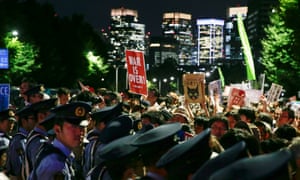Japanese prime minister Shinzo Abe’s coalition was set to approve legislation in the lower house of parliament on Thursday that could see troops sent to fight abroad for the first time since the second world war, despite thousands of protesters overnight chanting and holding up placards reading “No war, no killing”.
A lower house panel approval of the unpopular bills, which would drop a ban on collective self-defence or fighting to defend a friendly country such as the US, sparked a huge demonstration on Wednesday and more are planned.
The protest was reminiscent of those that toppled Abe’s grandfather from the premiership 55 years ago after he rammed a revised US-Japan security pact through parliament.
Crowds of protesters – organisers said 100,000 – gathered near parliament. Many stayed well into the night, chanting and holding up placards reading “Abe, quit”, “No war, no killing” and “Scrap the war bills”.
Passage of the bills by the full lower house is virtually assured given the ruling bloc’s big majority, although opposition parties were expected to boycott the vote.
The bills will then go to the upper house, and if no vote is taken after 60 days they will be returned to the lower house, where Abe’s coalition can enact them with a two-thirds majority.
Abe says a bolder security stance, welcomed by its ally the US, is essential to meet new challenges, such as those from a rising China.
Opponents say the revisions could entangle Japan in US-led conflicts around the world and violate pacifist article nine of the US-drafted, postwar constitution.
Abe, who returned to office in 2012 pledging to strengthen Japan’s defences and reboot the economy, has seen his support slip to about 40%.
Some analysts have begun to draw parallels to Abe’s grandfather, Nobusuke Kishi, a wartime cabinet minister who was premier from 1957 to 1960 and resigned on 15 July 11960 because of a public furore over the US-Japan security pact.
Others say Abe is likely to be re-elected in September for another three-year term as leader of his Liberal Democratic party, given weak opposition inside and outside the party.
The changes, reflected in new US-Japan defence cooperation guidelines, would also expand the scope for Japan’s military to provide logistics support to friendly countries, relax limits on peacekeeping operations and make it easier to respond to “grey zone” incidents falling short of war.
www.theguardian.com/world/2015/jul/16/japan-security-bills-through-lower-house-despite-protests




